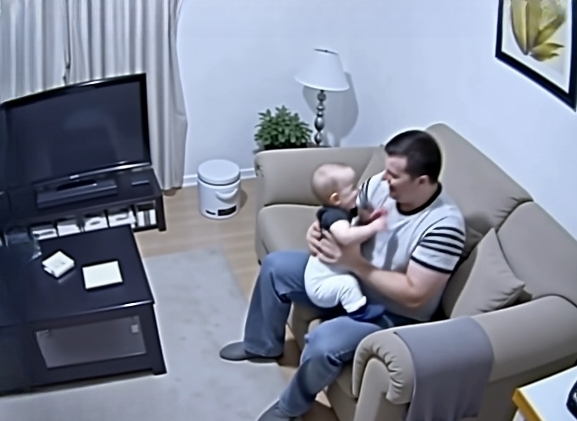For weeks, something about my husband felt off. It wasn’t just the way he seemed distracted at dinner or the late nights at work he never fully explained. It was the subtle shift in his presence, the quiet withdrawal that I couldn’t ignore. He used to greet me with warmth, but now it was a polite nod. What hurt the most was watching him pull away from Mia, our little girl, whose bright eyes always lit up at the sound of her dad’s voice. Even when he played with her, there was hesitation, almost fear, as if he were unsure of how to love her properly. The tension in my chest grew daily, an unspoken worry gnawing at me.
Every weekend, though, he insisted on staying home while I went to work. He said it was important for him to spend time with Mia, and I trusted him. But after those weekends, I noticed something unsettling: Mia would retreat into herself, avoiding his hugs, her smile a little more forced than before. Her tiny shoulders slumped in subtle disappointment, and I found myself asking questions I couldn’t answer. Was he upset with her? Had he done something wrong? My mind raced, and despite wanting to trust him, my gut told me there was something more I needed to see.
One Sunday morning, driven by equal parts worry and maternal instinct, I did something I never imagined I would: I set up a small camera in Mia’s room before leaving for work. My heart raced as I pressed “record,” the guilt threatening to overwhelm me. How could I spy on my husband? How could I betray his privacy? But the motherly instinct inside me was louder than the doubt. I told myself it wasn’t about mistrust—it was about understanding, about protecting Mia while uncovering the truth behind the emotional distance that had settled like a fog over our family.
That evening, I returned home and gingerly connected my laptop, my hands trembling. I pressed play, and the footage began. At first, everything seemed ordinary: Mia was playing on the floor, her little blocks scattered around her, while my husband sat nearby, absorbed in his phone. Relief briefly washed over me. Perhaps I had misread the signs. But soon, the screen revealed something I never expected, something that made my breath catch and my heart ache in the best possible way.
He set his phone down and turned his attention fully to Mia. Slowly, tentatively, he lifted her into his arms. Tears shimmered on his cheeks, and he whispered softly, “Daddy’s trying his best, baby.” His voice wavered, and a tremor ran through his small, awkward movements. He attempted a clumsy little dance to make her laugh, then tried to feed her, fumbling with the spoon and wiping sweat from his brow. It was clear he was terrified—not of Mia, but of failing her, of not knowing how to be the father she deserved.
As the footage continued, I watched him sit quietly on the floor, Mia nestled against him. “I’m scared you won’t love me if I don’t do this right,” he whispered, almost like a confession to himself. He spoke in soft murmurs, carefully brushing her hair from her face, ensuring she felt safe and loved even as he grappled with his own insecurities. I realized then that his distance wasn’t coldness—it was fear. Fear of inadequacy, fear of making mistakes, fear of not being enough. And that fear had kept him from showing the deep, tender love he carried inside.
The next morning, I couldn’t keep it inside. I approached him gently and told him I knew what he had been doing, what I had seen. He lowered his gaze, shame flickering across his features before surrendering to relief. Slowly, he confessed that he had been secretly taking online lessons on bonding with children, reading guides, watching tutorials, trying to teach himself how to be a good father. He felt like a failure, unworthy of Mia’s love, and had hidden his efforts out of embarrassment. He wanted desperately to learn how to connect with her in the right way.
We sat together in silence for a while, letting the truth sink in. Then, as tears streamed down both our faces, we spoke openly about fears, regrets, and hopes for the future. His confession was not one of weakness—it was courage in its rawest form. And in that moment, I felt a profound wave of empathy for him, realizing that love sometimes manifests quietly, hidden behind effort, anxiety, and the determination to get it right. Mia had unknowingly been witnessing a father learning to be brave, to love without fear.
From that day forward, our home felt lighter. Mia’s laughter returned, filling rooms that had felt heavier than ever in recent weeks. I watched them together—her small hand wrapped around his, his eyes soft and attentive—and felt an overwhelming gratitude for the man my husband was. Not perfect, but willing to fight for love every single day. I learned to notice the subtle gestures, the tender attentiveness, and the courage it takes to grow as a parent.
Sometimes, what appears as distance is not rejection or disinterest, but a silent struggle to love better. My husband’s journey taught me that true connection can require learning, patience, and humility. It reminded me that love is not always immediate or effortless; it is often messy, imperfect, and painstakingly earned through acts that may go unnoticed at first. But those acts, though quiet, are profound, carrying more weight than grand declarations ever could.
Now, I watch our family with a sense of wonder and renewed trust. The experience deepened my love for both Mia and my husband. It reminded me that vulnerability, effort, and patience are pillars of connection. The small moments—clumsy dances, whispered reassurances, gentle touches—shape the bonds that last a lifetime. And I am grateful every day that sometimes, the quietest struggles lead to the most beautiful expressions of love.
